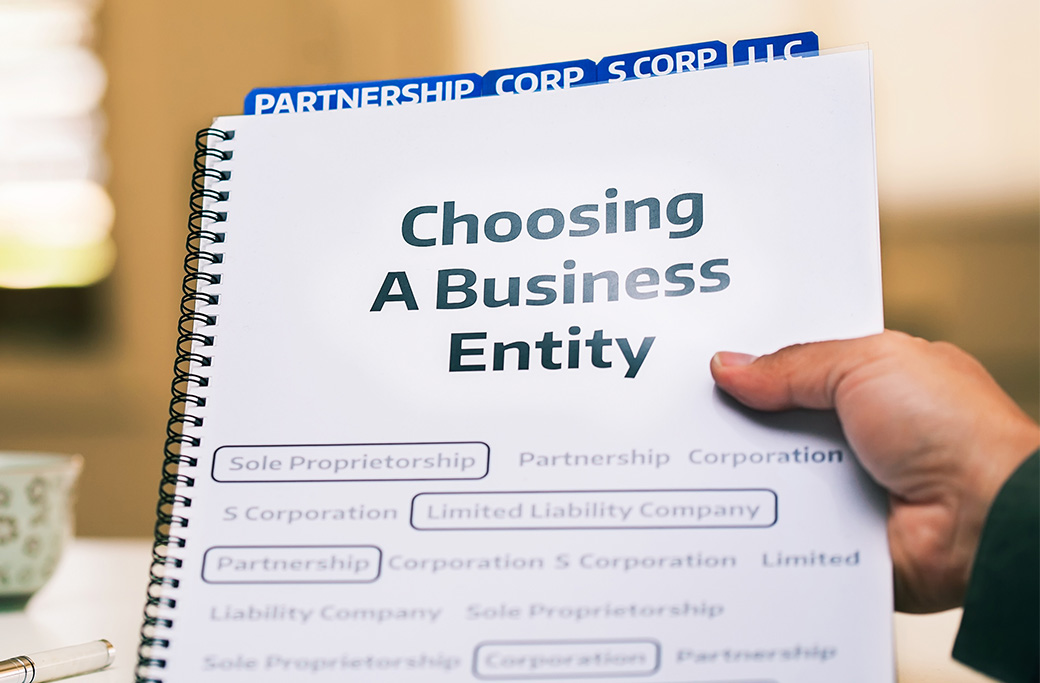
Starting a business comes with countless decisions, but few are as critical as choosing your business structure. This single choice affects how you pay taxes, raise capital, manage liability, and operate daily. Whether you’re launching a tech startup, opening a local restaurant, or starting a nonprofit organization, the entity type you select becomes the foundation for everything that follows.
Many entrepreneurs feel overwhelmed when faced with options like LLC, S-Corp, C-Corp, and nonprofit structures. Each comes with unique advantages, limitations, and requirements that can significantly impact your business’s success. The good news? You don’t have to navigate this complex decision alone.
At Lighthouse Small Business Solutions, our team brings over 40 years of combined entrepreneurial experience to help guide new business owners through this crucial choice. We’ve helped countless entrepreneurs establish the right legal structure for their vision, from setting up 501(c)(3) nonprofits to forming C-corporations ready for investment. Understanding your options is the first step toward building a business that can weather any storm.
Why Business Structure Matters More Than You Think

Your business structure isn’t just paperwork—it’s the framework that determines how your company operates, grows, and succeeds. The entity type you choose creates lasting consequences across multiple areas of your business.
Tax implications vary dramatically between structures. An LLC offers pass-through taxation, meaning profits and losses flow directly to your personal tax return. Meanwhile, C-Corps face double taxation, where the company pays corporate taxes and shareholders pay again on dividends. S-Corps provide a middle ground, combining liability protection with pass-through taxation benefits.
Liability protection represents another fundamental factor. Sole proprietorships offer no separation between personal and business assets, putting your home and savings at risk. LLCs and corporations create a legal barrier, protecting your personal wealth from business debts and lawsuits.
Ownership and fundraising capabilities differ significantly across structures. C-Corps can issue multiple stock classes and accept investments from venture capitalists and institutional investors. S-Corps face strict ownership limitations, allowing only 100 shareholders who must be U.S. citizens. LLCs provide flexibility but may complicate raising capital from certain investors.
Compliance requirements range from minimal to extensive. LLCs typically require less paperwork and fewer formalities than corporations. C-Corps must hold board meetings, maintain detailed records, and file complex tax returns. Nonprofits face the strictest compliance standards, including annual reporting to state and federal agencies.
Making the right choice from the start prevents costly restructuring later. While you can change business structures, the process involves legal fees, tax consequences, and administrative complexity that most entrepreneurs prefer to avoid.
Understanding Your Business Structure Options

LLC (Limited Liability Company)
The LLC combines the liability protection of a corporation with the tax benefits and operational flexibility of a partnership. This structure has become increasingly popular among small business owners who want protection without excessive formalities.
Key benefits include:
-
-
- Pass-through taxation eliminates double taxation concerns
- Flexible management structure allows owners to run the business however they choose
- Personal asset protection shields your home, car, and savings from business liabilities
- Minimal compliance requirements reduce ongoing administrative burden
-
LLCs work well for consultants, freelancers, small retail businesses, and professional services. The structure accommodates single-member LLCs for solo entrepreneurs and multi-member LLCs for partnerships. However, some investors prefer corporate structures, and certain states impose additional taxes on LLCs.
S-Corporation
The S-Corp election allows small businesses to enjoy corporate liability protection while maintaining pass-through taxation. This hybrid approach appeals to profitable small businesses seeking tax advantages.
Primary advantages:
-
-
- No double taxation as profits and losses pass through to shareholders
- Self-employment tax savings on distributions above reasonable salary requirements
- Credibility with customers, vendors, and lenders who prefer corporate entities
- Employee benefits can be provided tax-free to shareholder-employees
-
S-Corps face significant restrictions. They cannot exceed 100 shareholders, issue multiple stock classes, or include non-U.S. citizens as owners. These limitations make S-Corps suitable for family businesses, professional firms, and small companies with steady profits but limited growth ambitions.
C-Corporation
C-Corps represent the traditional corporate structure used by most large businesses and companies planning significant growth. While more complex than other options, C-Corps offer unmatched flexibility for raising capital and scaling operations.
Notable benefits:
-
-
- Unlimited fundraising potential through stock sales to any investor type
- Multiple stock classes accommodate different investor preferences and growth stages
- Perpetual existence continues regardless of ownership changes
- Tax deductions for employee benefits, including health insurance and retirement plans
-
The primary drawback involves double taxation, where the corporation pays taxes on profits and shareholders pay again on dividends. However, many growing companies reinvest profits rather than distribute them, minimizing this concern. C-Corps suit technology startups, manufacturing companies, and any business planning to seek venture capital or go public.
Nonprofit (501c3)
Nonprofit organizations serve charitable, educational, religious, or other exempt purposes while enjoying tax-exempt status. This structure requires mission-driven focus rather than profit maximization.
Key characteristics:
-
-
- Tax-exempt status eliminates federal income tax on related activities
- Donation deductibility allows supporters to claim charitable deductions
- Grant eligibility opens funding opportunities unavailable to for-profit entities
- Public trust enhances credibility with donors, volunteers, and beneficiaries
-
Nonprofits face strict compliance requirements, including detailed record-keeping, annual reporting, and limitations on political activities. The structure works for charitable organizations, educational institutions, religious groups, and professional associations focused on public benefit rather than private gain.
How to Choose the Right Structure for Your Business
Selecting the optimal business structure requires honest assessment of your goals, resources, and vision. Consider these essential questions:
How do you want to handle taxes?
If you prefer simplicity and want to avoid double taxation, LLCs and S-Corps offer pass-through benefits. If you plan to reinvest profits and eventually go public, C-Corp taxation may be worthwhile despite complexity.
Will you seek outside investors?
Venture capitalists and institutional investors typically prefer C-Corps due to their flexibility and familiar structure. If you plan to bootstrap or seek only small investments from friends and family, LLCs or S-Corps may suffice.
What’s your long-term growth vision?
Companies planning rapid expansion, multiple locations, or eventual public offerings often benefit from C-Corp structure. Smaller businesses focused on steady profits may find LLCs or S-Corps more appropriate.
Is your mission profit-driven or purpose-driven?
For-profit entities prioritize financial returns to owners, while nonprofits focus on charitable missions. This fundamental difference determines whether you need a traditional business structure or nonprofit status.
How much complexity can you handle?
LLCs require minimal ongoing formalities, while C-Corps demand board meetings, detailed record-keeping, and complex tax filings. Consider your administrative capacity and budget for professional services.
Common mistakes to avoid:
-
- Choosing based solely on startup costs without considering long-term implications
- Ignoring tax consequences and compliance requirements
- Failing to consult with experienced professionals
- Assuming one structure fits all business types
- Delaying the decision until tax or legal problems arise
Remember that circumstances change. A structure perfect for a startup may become limiting as the business grows. Many successful companies begin as LLCs and later convert to C-Corps when seeking investment or planning expansion.
How Lighthouse Small Business Solutions Can Guide Your Decision
At Lighthouse Small Business Solutions, we understand that choosing the right business structure feels overwhelming. Our personalized consultation process evaluates your specific goals, industry, and growth plans to recommend the structure that best serves your vision.
Our comprehensive business setup services include:
Personalized Structure Analysis: We review your business concept, funding plans, tax situation, and long-term goals to identify the optimal entity type. Our 40+ years of combined entrepreneurial experience helps us spot potential issues before they become problems.
Complete Formation Services: Whether you need an LLC, S-Corp, C-Corp, or 501(c)(3) nonprofit, we handle all legal filings, documentation, and initial compliance requirements. You focus on building your business while we manage the paperwork.
Tax Setup and Planning: Our team ensures your chosen structure integrates seamlessly with your tax strategy. We coordinate with QuickBooks setup to provide the financial reporting you need from day one.
Ongoing Compliance Support: Business structures require ongoing maintenance, from annual filings to board resolutions. We provide the support needed to keep your entity in good standing with state and federal requirements.
Integrated Business Services: Beyond formation, our comprehensive suite includes bookkeeping, payroll management, QuickBooks support, and financial analysis. This integrated approach ensures all aspects of your business work together effectively.
Growth-Focused Guidance: As your business evolves, we help assess whether your current structure still serves your needs. When the time comes to restructure or expand, we’re ready to guide you through the transition.
Our sister company, Lighthouse Management Services, even provides fractional CFO services for businesses needing strategic financial leadership without the cost of a full-time executive.
LLC, S-Corp, C-Corp, or Nonprofit: Choose the Right Structure for Your Business
Choosing the right business structure isn’t a one-size-fits-all decision. Your industry, growth plans, funding needs, and personal circumstances all influence which entity type serves you best. While the decision feels complex, understanding your options and getting professional guidance makes the path clear.
The entrepreneurs who succeed long-term don’t just pick a structure—they choose the foundation that supports their vision while providing flexibility for future opportunities. Whether you’re launching a tech startup that needs C-Corp flexibility, starting a consulting practice that benefits from LLC simplicity, or creating a nonprofit to serve your community, the right structure becomes a competitive advantage.
At Lighthouse Small Business Solutions, we’ve guided countless entrepreneurs through this important decision. Our comprehensive business setup services, combined with ongoing support in bookkeeping, payroll, and financial management, ensure your business launches with a solid foundation and continues growing on the right path.
Ready to make the right choice for your business? If you’re starting a new venture or questioning whether your current structure still fits your goals, reach out to Lighthouse Small Business Solutions today. Let our decades of experience and commitment to your success help illuminate the path forward. Your business deserves a structure that supports your dreams—let us help you build it right from the start.

